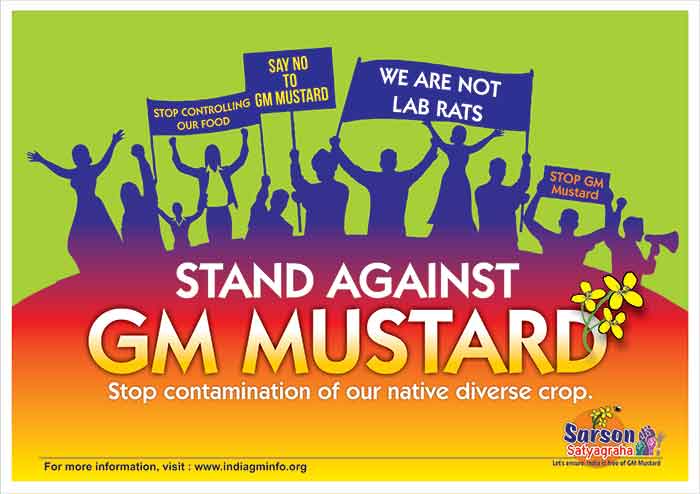
In recent weeks several groups which have been active on food safety issues have expressed concens about the serious health hazards involved in the increased possibility of introduction of imported or domestic GM foods in India. These concerns have been also related to the process of creating a regulatory framework by the Food Safety and Standards Authority of India (FSSAI).
In the latest initiative by such concerned groups including several independent experts and professionsls, as many as 162 doctors have endorsed a statement whch has been sent to the FSSAI authorities on February 3, 2022 by Dr. Arun Gupta, MD FIAP, Paediatrician, an expert on public health and nutrition. This has been sent as a response on regulations on GM Foods put out by FSSAI for public feedback, as per Section 22 of the Food Safety and Standards Act 2006 on behalf of a group of medical professionals from all over India, with different specialisations and expertise.
This statement says that GM foods, created out of deployment of modern biotechnology, are risky and therefore, there is obvious need for regulation. In India, the biosafety dossier of Bt brinjal and detailed analysis by numerous independent experts of the results of different health safety studies pointed to how it cannot be concluded to be safe for human health. In fact, the conclusions veered towards how it could be toxic as human food. Bt brinjal’s release in India was put on an indefinite moratorium in 2010. Herbicide Tolerant Mustard was the next GM food crop, which was hastily cleared by the regulators without the biosafety dossier even put out in the public domain. Tests that ought to have been done were not even done, just like in the case of Bt brinjal too.
After briefly presenting this review of past developments, this statement by 162 doctors says it appears that independent scientific scrutiny of the developers’ own data is being feared now. However, citizens once again resisted and opposed this, and commercial cultivation approval has been put on hold. While two GM food crops were stopped for cultivation in India through the presentation of scientific rationale that challenged any regulatory compromises, with citizens and state governments taking a firm stand against GM technology in our food and farming systems, FSSAI has now come up with these draft regulations.
Giving its opinion this important says –“It appears that these proposed regulations are actually a way to circumvent the fact that risky GM technology can be brought in only if regulations are compromised, and not by a rigorous biosafety assessment and protection regime (because any rigorous regime will reflect the inherently unsafe nature of this technology). These regulations have nothing about independent, long term, comprehensive, multi-generational biosafety assessment and seem to be ready to accept regulatory approvals for GM foods elsewhere, to allow them in India too. Such an approach obviously puts a question mark on the very purpose of notifying any regulations in the first instance. It is clear that India’s unique food cultures, our consumption and malnutrition situation, our poor state of public health and weak public healthcare systems, and our citizens’ preferences have all been set aside somewhat irresponsibly, as important considerations for framing these regulations.”
Voicing serious health concerns these 162 doctors say—“ It is a matter of additional concern that unknown and possibly toxic effects in undernourished children have been ignored in these draft regulations. State governments and their policy positions on the matter also do not seem to matter, even though Public Health is a state subject. Meanwhile, there is a body of scientific evidence to show the health risks that GM foods present. It appears to be from genes used in this technology and their toxic nature, from the genetic engineering process itself and the unpredictable, unstable changes that happen at the molecular level, from potential horizontal gene transfer and also from the toxic chemicals that usually accompany GM crops (the largest grown GM crops in the world, herbicide tolerant GM crops, have increased use and absorption of deadly herbicides by the crop, while insect resistance crops like Bt crops have toxins newly produced inside the plant even as pesticide usage increases in these crops too).”
Summarising some findings of published literature this report says—“ it appears like organ damage, reproductive health problems, immunity compromise, effects on growth and development of an organism, allergies and so on can be the adverse health impacts from GM foods. Studies also show altered nutritional composition of foods. In such a context, it is but natural that citizens expect utmost responsibility and commitment from FSSAI to fulfil its primary mandate related to food safety. However, the draft regulations do not reflect this. Further, it is clear that GM foods, especially in the case of imported GM foods, will be in the form of Ultra Processed Foods, consumption of which, by their nature of processing, presents several health hazards such as cancers, Type-2 diabetes, Obesity, Cardiac disease, depression, frailty to quote a few . By paving an easy way for GM foods, FSSAI would also be allowing unhealthy UPFs to flood our food chain.”
Drawing attention to some wider issues, this important statement tates that for far too long, the Food Safety Authority has been reluctant to regulate GM foods, for reasons unclear to us, even though it was ready to regulate recommended foods like organic foods, which are highly in demand. FSSAI did not take stringent and deterrent action against sale of GM foods even though they were illegal and unpermitted. Now, it is seeking to formally pave the way for easier entry of all kinds of GM foods.
Finally, taking a clear stand on this important issue, these doctors say—“Through this letter, we want to let you know, as medical professionals, that the draft regulations are unacceptable in terms of their ability to uphold food safety. Today, the reality is that no GM foods have been permitted to be imported into, or sold in India. This de jure regulatory reality should be implemented, with penal action taken against anyone selling GM foods. This is what we seek from FSSAI. It should essentially ensure that GM foods do not enter our food chain, and that its regulatory tools and mechanisms (of sampling, inspection, testing etc.) ensure that no GM foods are sold in India. We therefore request you to withdraw the proposed unacceptable regulations completely, and revise the proposals drastically to ensure that the regulatory regime is mainly to keep GM foods out of the diets of Indians.”
The very clear stand by these doctors is very commendable and they have rendered a great public service and fulfilled their duty as guardians of public health by speakng out so clearly on this urgent issue at the right time. More and more doctors, health and nutritioun experts should come forward to support their stand. Clearly GM foods pose one of the greatest health hazards, an unacceptably high health hazard and environmental hazard and should be resisted and stopped by a very strong nationwide campaign.
Bharat Dogra is Honorary Convener, Campaign to Save Earth Now. His books include Planet in Peril, Man Over Machine, 14 Questions on GM Crops and GM Faslon par 11 Sawal.














































